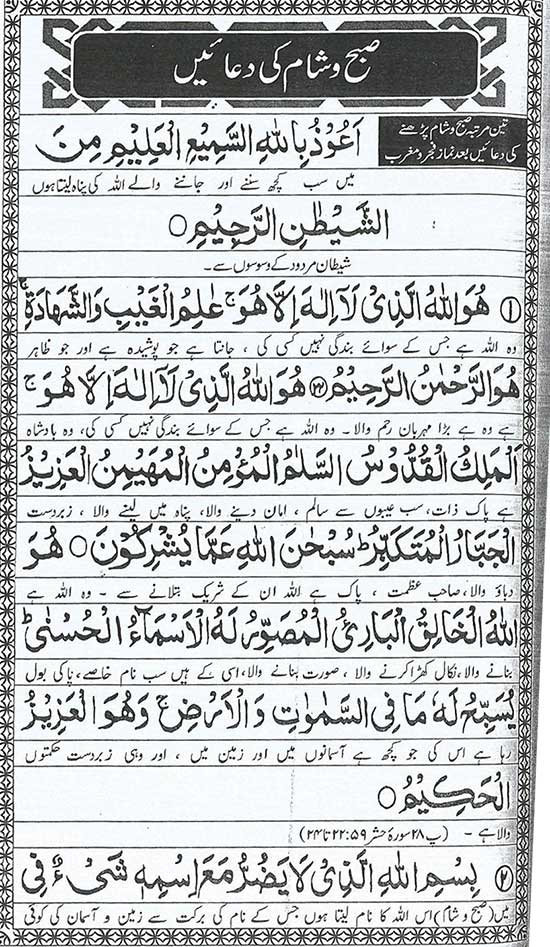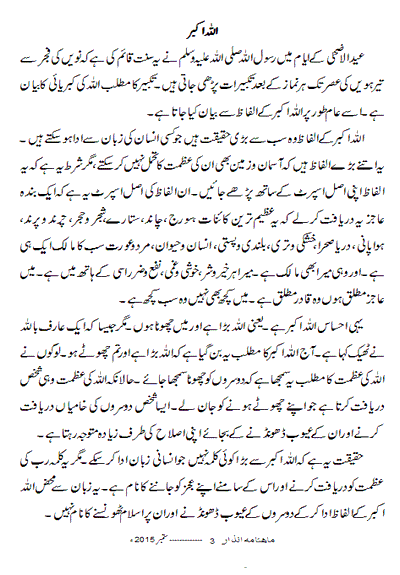
Refuge In Allah Alone
SEEKING refuge with Allah against things a person fears or is cautious about is one of the aspects of worship.
Allah mentions in the Qur’an:
Say: “I seek refuge with (Allah), the Lord of the daybreak. (Qur’an, 113:1)… until the end of the Surah.
Also, (Allah said about Musa in the Qur’an):
Musa (Moses) said: “Verily, I seek refuge in my Lord and your Lord from every arrogant who believes not in the Day of Reckoning!” (Qur’an, 40:27)
Also, in the Hadith of the Prophet (peace be upon him): “Whoever comes to rest at a place says this supplication – ‘I seek protection in Allah’s complete words from the evil that He has created’ – nothing shall harm him until he moves from that place where he is.”
Allah also informed us that the Mushrikeen (polytheists) who the Prophet (peace be upon him) fought against, used to seek refuge in deities other than Allah. Whoever seeks refuge in the Jinn, the dwellers of the graves, the dead, or an angel so that they may avert some harm from him or bring some benefit, then seeking refuge in the created being in this way is something which is not permissible because Isti’adhah (seeking refuge) is an act of worship and should be directed to Allah alone.
Allah said:
“And verily, there were men among mankind who took shelter with the males among the jinn, but they (jinn) increased them (mankind) in sin and transgression.” (Qur’an, 72:6)
The Springs of Paradise
In Paradise there are many springs that provide drinks of different tastes:
“Truly al-Muttaqoon [the pious and righteous] will be amidst Gardens and Water-springs” [15:45]
“Verily al-Muttaqoon shall be amidst shades and springs.” [77:41]
Concerning the two Gardens which Allah (swt) has prepared for those who fear their Rabb, Allah (swt) said, “In them [both] will be two springs flowing [free].” [55:50]
And concerning the two Gardens beneath them, He said, “In them [both] will be two springs gushing forth water.” [55:66]
In Paradise there are two springs from which al-Muqarraboon will drink pure and undiluted, whilst the Abraar will drink their water mixed with something else. The first is the spring of Kafoor, as Allah (swt) says:
“Verily the Abraar [the pious, those who fear Allah and avoid evil], shall drink a cup [of wine] mixed with water from a spring in Paradise called Kafoor, A spring where from the slaves of Allah will drink, causing it to gush forth abundantly.” [76:5-6]
He tells us that the pious will drink from it mixed with something else, whilst those close to Allah will drink it pure and undiluted.
The second spring is of Tasneem, as Allah (swt) says:
“Verily al-Abraar will be in delight [Paradise], On thrones, looking [at all things]. You will recognize in their faces the brightness of delight. They will b given to drink pure sealed wine, the last thereof [that wine] will be the smell of musk, and for this let [all] those who strive who want to strive [ i.e. hasten earnestly to the obedience of Allah]. It [that wine] will be mixed with Tasneem, a spring whereof drink those nearest to Allah.” [83:22-27]
Another of the springs of Paradise is called al-Salsabeel as Allah (swt) says:
“And they will be given to drink there a cup [of wine] mixed with zanjabeel [ginger], a spring there, called Salsabeel”. [76:17-18]
This is probably the same spring as that mentioned above, i.e. Kafoor.
- September, 3
- 4412
- Info, Paradise-Hell
- More
The First People To Enter Paradise
The first of mankind to enter Paradise will be our Prophet Muhammad (saw) and the first nation to enter Paradise will be his ummah. The first member of this ummah to enter will be Abu Bakr as-Siddiq (ra).
Ibn Katheer quotes a number of Hadith [an-Nihayah, 2/213] that state this such as the report of Muslim from Anas (ra) according to which the Messenger of Allah (saw) said, “I will be the first one to knock at the gates of Paradise”.
Muslim also reported from Anas that the Messenger of Allah (saw) said: “I will come to the gates of paradise and ask for it to be opened. The gatekeeper will ask, “Who are you?” I will say, “Muhammad”. The gatekeeper will say, “I was ordered not to open the gate for anyone else before you””.
al-Bukhaari, Muslim and an-Nasaa’ee report from Abu Hurayrah (ra) that the Prophet (saw) said: “We are the last, but we will be the first on the Day of Resurrection. We will be the first of mankind to enter Paradise”.
Abu Dawood reports from Abu Hurayrah (ra) that the Prophet (saw) said, “Jibreel came to me, and showed me the gate of Paradise through which my ummah will enter”. Abu Bakr said, “O Messenger of Allah (saw), would that I had been with you to see it!”. The Messenger of Allah (saw) “But you, O Abu Bakr, will be the first of my ummah to enter Paradise”.
- September, 2
- 4343
- Paradise-Hell
- More
Peghambar-e-Islam Ka Turka

Don’t You Know How To Cook?
BURSTING over food not cooked to our taste is a sin that few escape. Extreme fury and anger, mostly with spouses, is expressed with rejecting food and refusing to eat, undermining this great blessing many are deprived of.
Yes, mistakes happen. The wife may have forgotten to add salt.
In such situations, we ought to be patient, as the Prophet (peace be upon him) was when his wives cooked food he didn’t like. He sat, and said nothing at all, nor did he eat from it.
Abu Hurairah reported: The Messenger of Allah (peace be upon him) never found fault with food. If he had inclination to eating it, he would eat; and if he disliked it, he would leave it. (Al-Bukhari and Muslim)
Commentary from Riyad-us-Saliheen: “This Hadith throws light on the Prophet’s excellent manners which ought to be followed by all Muslims.
It is a deplorable state of affairs that when we find a dish a bit unsavory, we lose our temper and create quite a scene in the house.”
Another important aspect is not hurting someone’s feeling. He or she might have exerted so much effort in cooking that for us. Positive and encouraging statements are more helpful in correcting people than hurting their feelings.
- August, 31
- 2371
- Prophet Character
- More
Learning Hajj
THE Messenger of Allah (peace be upon him) said, “Umrah is an expiation for the time between it and the previous Umrah, and an accepted Hajj has no less a reward than Paradise.” (Al-Bukhari)
The person who intends to perform Umrah “clips his nails, trims his mustache, shaves his pubic hair, and plucks out the hair of his armpits. Then he performs Ghusl (complete bath), and the male pilgrim wears an Izar (lower garment worn at the waist like a bath towel) and a Rida’ (a garment worn over the shoulders) that are both clean and white.” (Note: Women may enter the state of Ihram in any clothing within the Shariah guidelines.
After completing this and while approaching one of the Meeqat (marked posts around Makkah for Hajj and Umrah), he should enter the state of Ihram which is “the intention to enter into one of the two sacred rituals, Al-Hajj or Al-‘Umrah.”
The state of Ihram has certain prohibitions; some of which are as follows:
• Wearing stitched clothing such as shirts, socks, hoods, and a thawb by men
• Applying perfume
• Shaving the hair or cutting it, even a little
• Clipping the nails of either the hands or feet.
• Having sexual intercourse with one’s spouse and the actions that precede it like kissing.
The pilgrim should then begin the Talbiyyah (answering of the command) and continue it until he reaches Masjid Al-Haraam. The Talbiyyah is to say: Labbaik Allahumma Labbaik, Labbaik Laa Shareeka Laka Labbaik. Innal-Hamda Wann-Ni’mata Laka Wal-Mulk, Laa Shareeka Lak.
The meaning of the wording for the Talbiyyah is: “I am here at Your service, O Allah; I am here at Your service. I am here at Your service; You have no partner; I am here at Your Service. Verily the Praise, and the Blessings are Yours, and also the Sovereignty. You have no partner.”
To Whom Do We Complain?
The ignorant among us complain to people about Allah, and this is the highest degree of ignorance. If one knew his Lord, he would never complain about Him; and if knew the (reality of) people, he would not complain to them.
One of the predecessors saw a man complaining to another man about his poverty and dire necessity, so he said to him, “O you! By Allah, you have done nothing but complain about He who has mercy for you, to someone who has no mercy for you.”
A poet said: When you complain to a son of Adam, verily you complain about the Most Merciful, to the one who does not have any pity.
On the contrary, a person who is profoundly knowledgeable about Allah complains to Allah alone, and never to the people. He complains about the causes because he knows the verses:
“And whatever of misfortune befalls you it is because of what your hands have earned. And He pardons much.” (Qur’an, 42:30)
“Whatever of good reaches you, is from Allah but whatever of evil befalls you, is from yourself.” (Qur’an, 4:79)
“(What is the matter with you?) When a single disaster smites you, although you smote (your enemies) with one twice as great, you say: ‘From where does this come to us?’ Say (to them), ‘It is from yourselves (because of your evil deeds).’ And Allah has power over all things.” (Qur’an, 3:165)
The lowest of people complain about Allah to His creatures, while the highest of people complain about their own-selves to Allah.
Allahu-Akbar

50 Things To Be Done During Hajj
[..1] Smile in another Muslims face
[..2] Say Salam to strangers
[..3] Shake someone’s hand and ask about their health
[..4] Buy tea for someone
[..5] Offer to get someone’s groceries
[..6] Sit with a Hajj group from another country and ask about Islam in their village
[..7] Carry someone’s bags for them
[..8] Guide someone ill to the infirmary
[..9] Shun vain talk
[10] Recite talbiyah loudly, encouraging others
[11] On the days of Eid, walk through the tents reciting Talbiyah loudly reminding others
[12] Gather stones for people
[13] Offer to throw on behalf of unable Hajjis
[14] Guide people to the Jamarat
[15] Lower your gaze
[16] Remind people of the lives of the Sahaabah
[17] Read Qur’an with the Tafseer
[18] Do the authentic Dhikr of the morning and evening
[19] Make dua during your Sajdah
[20] Stand to the side of a gate and offer people water/tea as they leave

